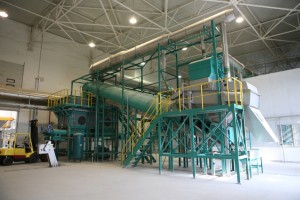In Beijing, turning Kung Pao Chicken into organic fertilizer

 BEIJING -- For a place which deals with tons of rotting garbage each day, Beijing’s Gaoancun food waste processing plant smells surprisingly pleasant.
BEIJING -- For a place which deals with tons of rotting garbage each day, Beijing’s Gaoancun food waste processing plant smells surprisingly pleasant.
Every evening trucks carrying half-eaten cabbage, decomposing Kung Pao Chicken, and other food discarded in restaurants and canteens across Beijing make their way to the plant, built on a converted garbage dump in a western corner of the city.

After rouge chopsticks and other non-organic waste are filtered out, the remaining waste is poured into vats heated at 80 degrees Celsius, where it mixes with a specially manufactured enzyme. Ten hours later, the waste emerges as a powdery brown coloured fertilizer, which the plant’s designers say is ideal for growing organic fruit and vegetables.
Food waste accounts for more than half of the nearly 20,000 tons of garbage Beijing generates daily, most of which is buried underground. Beijinger’s penchant for fried food means that the city’s waste is surrounded by a layer of cooking oil, which locks out oxygen required for the food to biodegrade properly. Food waste’s high water content makes it tough to burn, raising the costs of incineration.
For companies like Goldenway Biotech, who built the Gaoancun plant, Beijing's food waste mountain is a business opportunity. The company sells its waste generated fertilizer to organic farms, answering a pressing need in China, which uses more chemical fertilizer than any other country. Ten million tons of fertilizer pollute Chinese waterways each year, killing off wildlife and contributing to spectacular blooms of green algae visible in Chinese rivers. Goldenway says it can produce 0.6 tons of organic fertilizer from a single ton of food waste, while water and carbon dioxide are the only waste products from the process, the firm's PR manager Yi Dan said.
Goldenway has opened eight similar plants across China. The company's secret is its garbage eating enzyme, developed in a lab in the Southern Chinese city of Chengdu, according to Yi. “We’ve already registered twenty patents in China,” she said.
The Gaoancun plant is the company's largest, with a the potential to produce 400 tons of fertilizer per day. But difficulties encouraging resturants to donate their waste food mean that it currently produces less than half that. "The collection scheme is run by the Beijing government, so we're dependent on them for food deliveries," Yi said.
Despite the plant’s apparent environmental benefits, Beijingers remain suspicious. Residents of one city suburb took to the streets with home-made banners last November, calling on the local government to cancel the construction of one of the firm's waste food processing plants in their neighborhood, claiming that that it would produce an unpleasant smell.
Yi blames the incident on the company’s failure to communicate effectively with the public. “The residents didn’t understand the technology,” she said. The lack of smell at the Gaoancun plant seems to support her view. Local reports indicate that development is still going ahead.
Goldenway’s latest PR strategy centers on fresh strawberries. In a series of plastic polytunnels decorated with pictures of grinning cartoon fruit, the company grows juicy strawberries using its fertilizer, which it hands out in immaculate white gift boxes. Apple, pear and cherry trees will follow later this year, Yi said. Goldenway plans to IPO in the next two years, but its success will depend on whether Chinese city dwellers can be persuaded to associate food waste processing with the fragrance of freshly picked strawberries, rather than rotting meat.
Pictures: Goldenway Biotech; Tom Hancock
This post was originally published on Smartplanet.com
